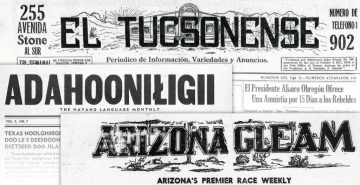Collections as Data grant to support student data literacy using historical newspapers

Left to right: Anita Huizar-Hernández, Jeffrey C. Oliver, Megan Senseney, Cristina Ramírez, Mary Feeney, Katherine Morrissey, Erika Castaño
Newspapers are an important primary resource and source of inquiry in undergraduate courses of various disciplines. A cross-campus group of University of Arizona librarians and faculty members has been awarded a Collections as Data: Part to Whole grant funded by The Andrew W. Mellon Foundation. The project, titled "Using Newspapers as Data for Collaborative Pedagogy: A Multidisciplinary Interrogation of the Borderlands in Undergraduate Classrooms," will introduce students to data literacy using digitized historical newspapers from Arizona.
Using data science to reveal meaning in newspapers

This fall, treating digitized historical newspapers as a dataset, librarians and faculty members will teach students computational text analysis, which allows meaning to be extracted from large amounts of text.
Textual analysis will enable students to explore community tensions and responses to events, compare news coverage across English and Spanish newspapers in the border region, trace shifts in language used to depict communities within the borderlands, understand gender and suffrage in journalism, and track literary works in serial publications through author identification.
The dataset represents the periods 1915-1922 and 1941-1959 and will include selections from Libraries’ Historic Mexican and Mexican American Press digital collection. It will also have Spanish-language and African American newspapers which were digitized through a partnership with the Libraries and the State of Arizona Library for the National Endowment for the Humanities-funded National Digital Newspaper Program.
Supporting the university strategic plan
Not only does this project highlight the Libraries' commitment to student success and documenting the US-Mexico borderlands, but it also addresses two initiatives of the university's strategic plan: establishing data literacy in undergraduate education and creating an interdisciplinary curriculum for border studies.
The project will culminate in a student symposium and a white paper with recommendations based on lessons learned, as well as a model for the computational use of digitized newspapers in undergraduate curriculum.
The team
The interdisciplinary team is led by Librarian Mary Feeney, Libraries Vice Dean Sarah Shreeves and Assistant Professor of Border Studies Anita Huizar-Hernández. Disciplinary faculty participating in the project include:
- Celeste González de Bustamante, Associate Professor of Journalism and Director of the Center for Border and Global Journalism
- Marya McQuirter, Director of the Public History Collaborative and Assistant Professor of History
- Katherine Morrissey, Associate Professor of History
- Cristina Ramírez, Associate Professor of English and Program Director of the Rhetoric, Composition, and the Teaching of English graduate program
Libraries faculty members supporting the project include:
- Katheryne B. Willock Head of Special Collections Verónica Reyes-Escudero
- Office of Digital Innovation and Stewardship Department Head Megan Senseney
- Assistant Librarian and Archivist Erika Castaño
- Data Science Specialist Jeffrey C. Oliver
